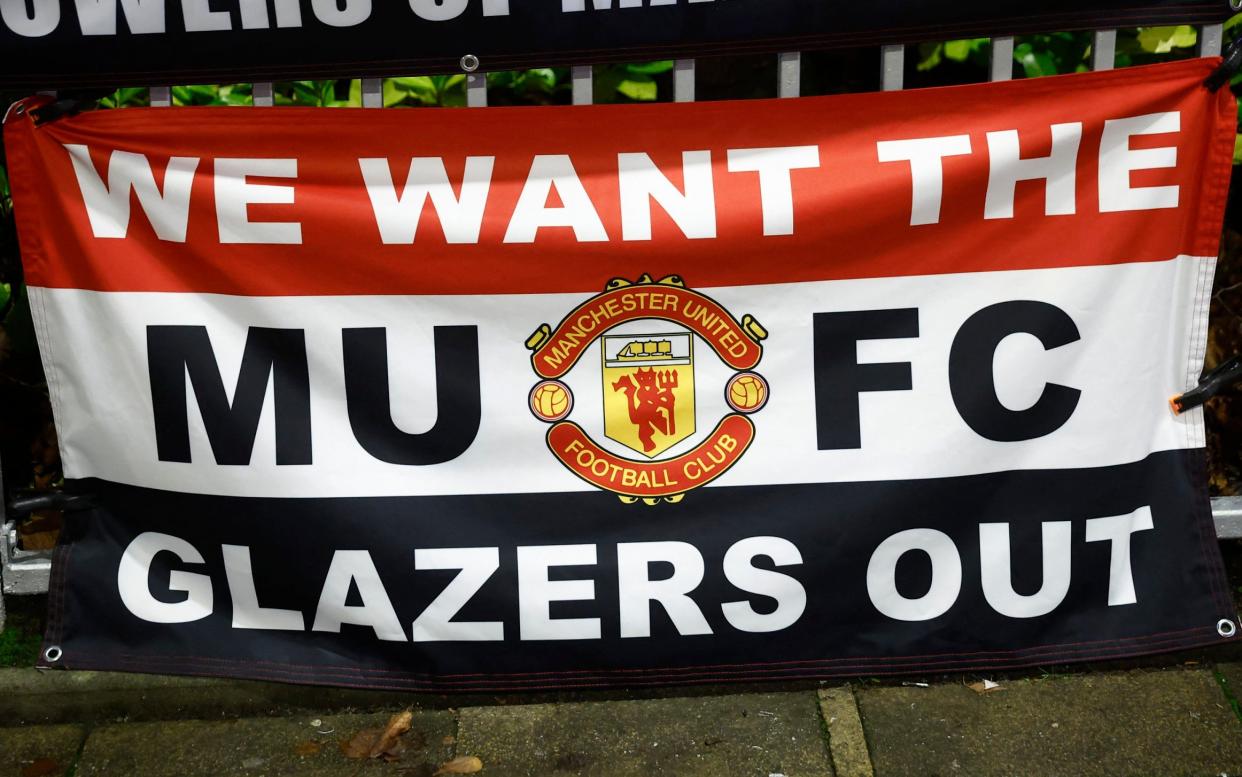Glazers’ money grab shows them for what they are – they must be driven out for good

- Oops!Something went wrong.Please try again later.
- Oops!Something went wrong.Please try again later.
- Oops!Something went wrong.Please try again later.
At least now we can drop the last vestiges of pretence. Manchester United’s so-called “strategic review” was, they told us, “designed to enhance the club’s future growth, with the ultimate goal of positioning the club to capitalise on opportunities both on the pitch and commercially”.
It would, they said, “strengthen the club, including stadium and infrastructure redevelopment, and expansion of the club’s commercial operations on a global scale, each in the context of enhancing the long-term success of the club’s men’s, women’s and academy teams, and bringing benefits to fans and other stakeholders”.
Of course, the only line that carried any real weight was the one directly attributed to Joel and Avram Glazer, the United co-chairmen, who explained that “throughout this process we will remain fully focused on serving the best interests of our fans, shareholders and various stakeholders”.
Strip out the bit about “our fans”, whose wishes have been ignored for the best part of 18 years, and the essence of the strategic review was laid bare: a money grab, designed not to “enhance the club’s future growth” but to swell the bank balance of six siblings in Florida. Bottom line over scoreline, as some staff at United describe the Glazer era. It was ever thus.
The Glazers are due to pocket over £500 million from the sale of a 25 per cent stake in United to the Ineos billionaire Sir Jim Ratcliffe, with the other half of the £1.03 billion purchase price going to other shareholders.
Put another way, that is a similar figure to the debt burden that was loaded on to the club when the Americans completed their hostile takeover in 2005, and which has remained largely unchanged ever since.
Equally, £500 million is not too far short of the £600m plus that the Glazers have already creamed in collectively through dividend payments and the past sales of Class A shares, which carry only one tenth of the voting rights of the B shares so meant they were never at risk of giving away any meaningful control.
The Glazers may argue that, with Ratcliffe due to invest a further £237 million in staggered investment for infrastructure needs and being given control of sporting operations, that the strategic review has delivered.
Others will regard it as little more than a sop that raises many more questions than answers and has allowed the Glazers to remain in situ while enjoying another fat pay day that will sicken most fans.
Perhaps, in time, Ratcliffe will be able to wrest full control of the club from the Glazers and, if this is to mark the beginning of the end of Florida rule, then supporters may view that as better than nothing. But what the Americans have done in the shorter-term offers the most transparency yet about their priorities.
What owner of genuine repute or serious standing would hand over control of football operations to a minority shareholder? In doing so, the Glazers are effectively saying that 25 per cent of Manchester United is about football.
They are – at least symbolically – giving away the bit that relates to the actual sport and keeping control of the arm that makes the cash. With that mindset, is it any wonder United have struggled so badly on the pitch since Sir Alex Ferguson retired?
So United have around £240 million with which to try to tart up Old Trafford. Good luck with that. The indications are that redevelopment and expansion of the stadium – or the creation of a new stadium in the shadow of the existing ground – would cost anywhere between £800 million and £2 billion.
If the Glazers handed over their £500 million windfall then United would have close to a pot of £850 million to work from. With financing on top, building a stadium worthy of the self-styled biggest club in the world would very quickly feel achievable.
Yet barring the Americans suddenly feeling charitable or breaking with the habit of a lifetime, Old Trafford may not be getting more than a few expensive sticking plasters for the foreseeable future.
In the wake of their role in the failed European Super League plot, Joel Glazer told fans he was “personally committed to rebuilding trust” with them. It was a nonsense, of course.
The Glazers paid lip service to supporters then and they have done the same with the strategic review. Their arrogance is breathtaking.

